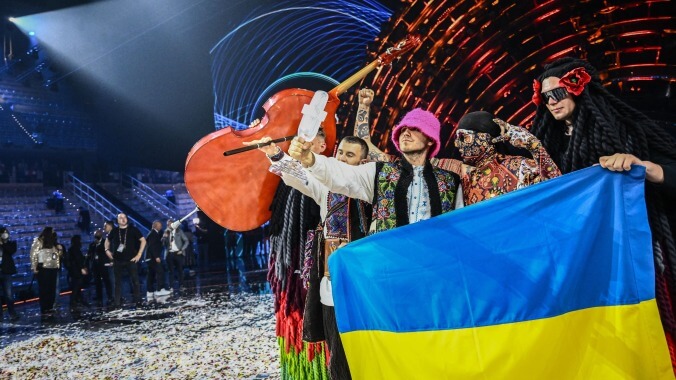Though the United States has only been aware of the wild thrills of the Eurovision Song Contest for a relatively short time, it has become pretty clear in that short time that Eurovision involves a surprisingly complex system of agreed-upon rules and regulations for the countries that are competing. As we learned last year, you might get accused of doing cocaine if you celebrate too much after you win, but if you do use drugs, there’s not necessarily anything the European Broadcasting Union—which runs the contest—can do about it. However, you could be disqualified from the competition if your song is too political or if your country is later dissolved (the former happened to Belarus and the latter happened to Yugoslavia.
For next year’s competition, though, The Hollywood Reporter says one rule is being broken but the EBU itself: Despite Ukrainian band Kalush Orchestra winning this year’s Eurovision Song Contest, Ukraine will not be allowed to host the event in 2023. That is traditionally how the system works, giving the countries themselves an incentive to win beyond supporting whatever local musical act they sent to represent them, but the EBU has officially declared that Eurovision 2023 will not be held in Ukraine because of Russia’s invasion. (Invading another country will also get you booted from Eurovision.)
There’s no “you’re not allowed to host Eurovision if your country is invaded by a desperate, power-mad megalomaniac,” but there apparently are provisions for “a force majeure situation such as an ongoing war.” THR says Ukraine had warned of a “severe” risk of air raids or missile attacks and “additional expert security advice” said there will be a “‘high’ risk of a mass casualty event at the 2023 Eurovision event” if it were held in Ukraine as planned.
That’s all grim and scary, seeing as how we’re talking about something that is so dedicated to good, clean fun that last year’s winner Måneskin got in trouble for having too much fun, so maybe it’s for the best that “other public broadcasters” (THR only mentions the BBC as an alternative) are now in talks to replace Ukraine as next year’s host.









































